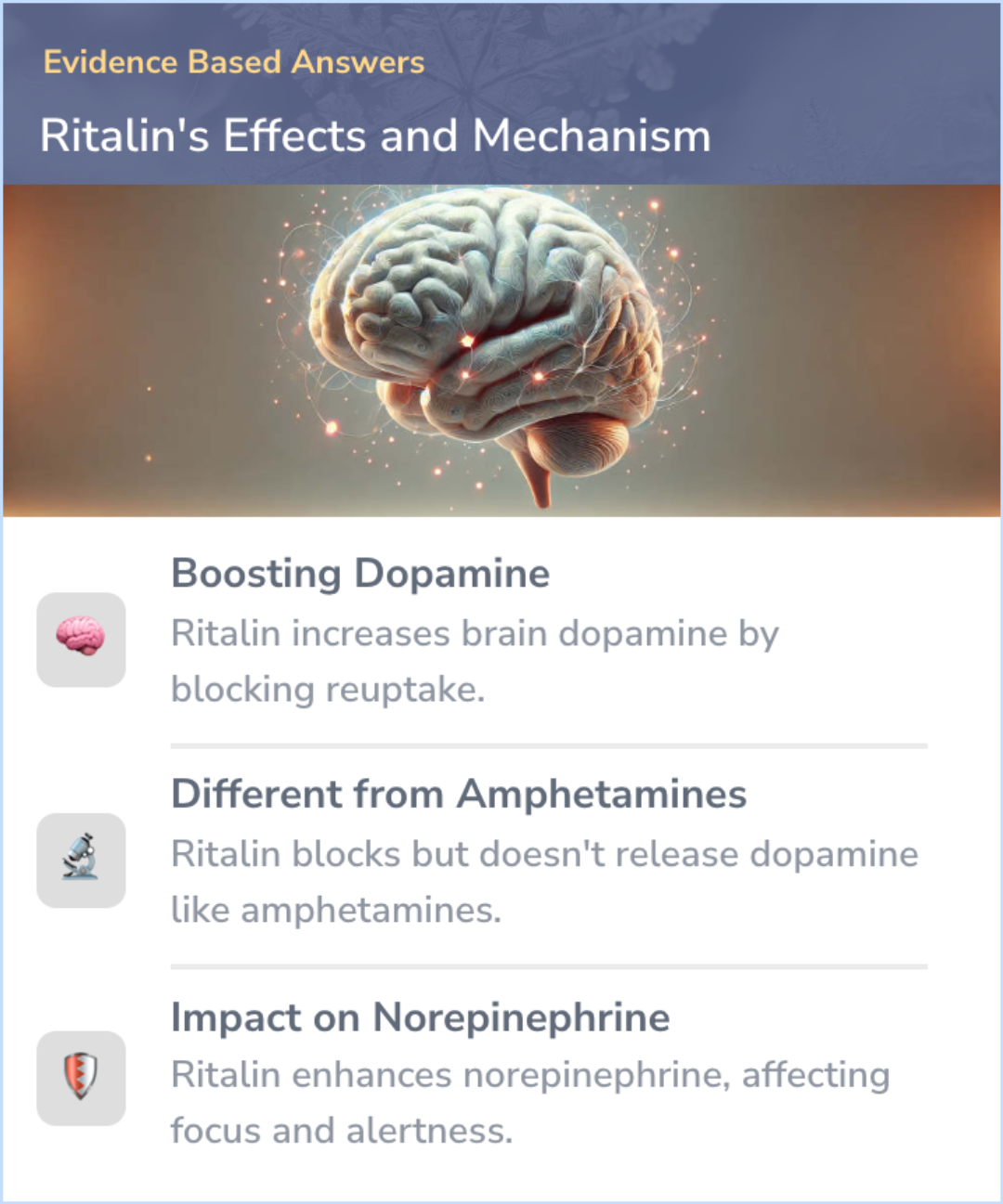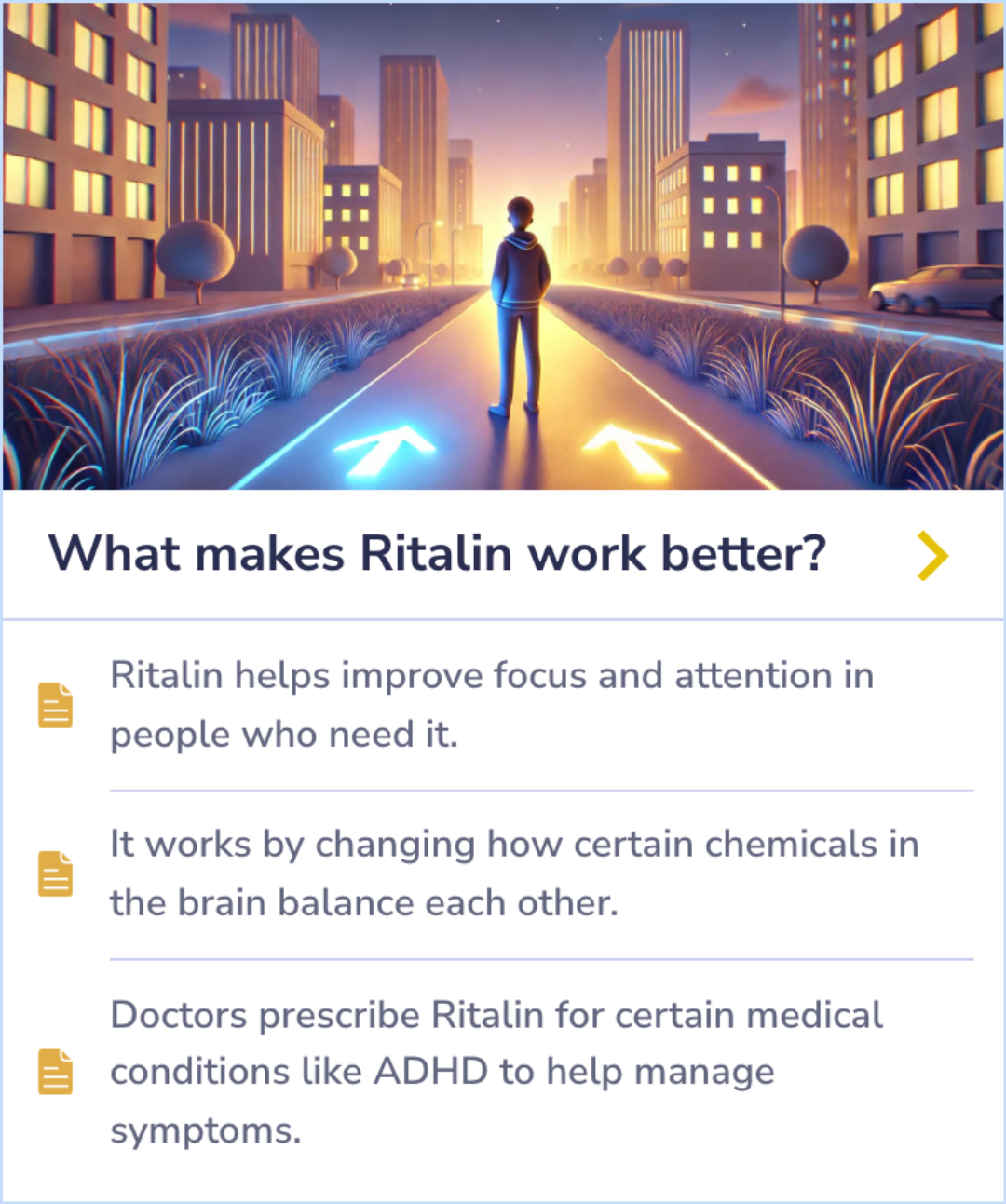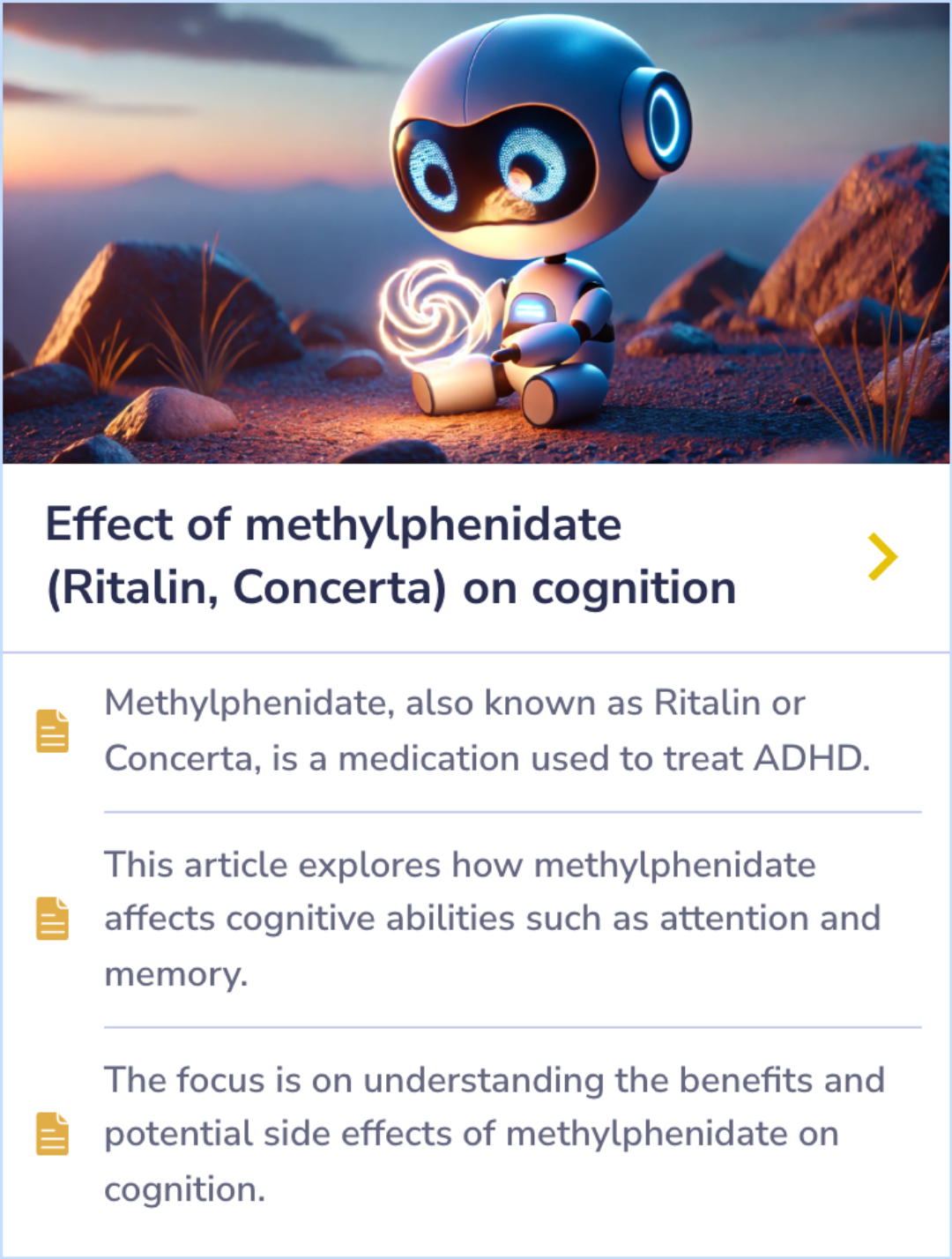Ritalin
Evidence Based Answers
What is the action of Ritalin?
Using Ritalin without ADHD can affect dopamine and norepinephrine, altering focus and attention. It raises ethical and safety concerns in healthy individuals.
Published: November 2, 2024
Click to explore a section:

Ritalin boosts dopamine by blocking reuptake, differs from amphetamines, and also enhances norepinephrine.
Background: Indications
Ritalin is commonly prescribed for conditions like ADHD and narcolepsy. It is used as part of a comprehensive treatment plan that involves psychological, educational, and social support to achieve a balanced effect.
The medication helps individuals with ADHD focus, manage energy levels, and control impulses. For narcolepsy, it aids in regulating sleep patterns by improving alertness, addressing symptoms related to the condition.
The medication helps individuals with ADHD focus, manage energy levels, and control impulses. For narcolepsy, it aids in regulating sleep patterns by improving alertness, addressing symptoms related to the condition.
Ritalin's Mechanism: Boosting Dopamine Levels
Ritalin increases dopamine levels in the brain, which supports focus and attention, especially for managing ADHD symptoms.
It achieves this by blocking dopamine transporters, preventing dopamine from being reabsorbed and allowing it to remain active longer in the brain.
Primarily affecting areas linked to motivation and focus, Ritalin’s approach is different from amphetamines, which release newly produced dopamine.
It achieves this by blocking dopamine transporters, preventing dopamine from being reabsorbed and allowing it to remain active longer in the brain.
Primarily affecting areas linked to motivation and focus, Ritalin’s approach is different from amphetamines, which release newly produced dopamine.
“
Source Quotes:
Methylphenidate binds to the dopamine transporter in the presynaptic cell membrane, blocking reuptake of dopamine and causing a resultant increase in extracellular dopamine levels.
Methylphenidate blocks the reuptake of two neurotransmitters, norepinephrine (NE) and dopamine, in presynaptic neurons.
How Ritalin's Action Differs from Amphetamines
While both Ritalin and amphetamines are stimulants used to manage ADHD, they operate through different mechanisms. Ritalin primarily blocks the reuptake of dopamine, which increases its levels in the brain.
Amphetamines, in contrast, trigger the release of newly synthesized dopamine, creating a unique stimulant effect.
These differences may lead to variations in how individuals respond to each medication.
Amphetamines, in contrast, trigger the release of newly synthesized dopamine, creating a unique stimulant effect.
These differences may lead to variations in how individuals respond to each medication.
“
Source Quotes:
This central nervous system stimulant has a mechanism of action distinct from that of amphetamine.
The effects of methylphenidate on catecholamine metabolism differ from amphetamine.
Ritalin's Broader Impact: Norepinephrine and Serotonin Effects
In addition to dopamine, Ritalin affects norepinephrine, a neurotransmitter associated with alertness and focus, by blocking its reuptake.
This action increases norepinephrine levels, which could help in managing ADHD symptoms.
Some research suggests that Ritalin may also have a minor impact on serotonin pathways, potentially balancing neurotransmitter activity.
This action increases norepinephrine levels, which could help in managing ADHD symptoms.
Some research suggests that Ritalin may also have a minor impact on serotonin pathways, potentially balancing neurotransmitter activity.
“
Source Quotes:
Investigators have postulated that methylphenidate may work via serotonergic neurons to reduce hyperactivity by restoring a lost balance between certain dopaminergic and serotonergic neuronal circuits.
Methylphenidate blocks the reuptake of two neurotransmitters, norepinephrine (NE) and dopamine, in presynaptic neurons.
Key Takeaways
Conclusions
Ritalin enhances focus and attention by increasing dopamine levels in the brain, playing a central role in managing ADHD symptoms. This occurs through blocking dopamine transporters, ensuring dopamine remains active longer.
Unlike amphetamines, which release new dopamine, Ritalin acts chiefly on existing dopamine reuptake, offering distinct stimulant effects. Additionally, Ritalin blocks norepinephrine reuptake, aiding alertness, and potentially interacts with serotonin pathways, contributing to broader behavioral impacts.
Unlike amphetamines, which release new dopamine, Ritalin acts chiefly on existing dopamine reuptake, offering distinct stimulant effects. Additionally, Ritalin blocks norepinephrine reuptake, aiding alertness, and potentially interacts with serotonin pathways, contributing to broader behavioral impacts.

Evidence Summary
How Ritalin Enhances Focus and Attention
Ritalin boosts focus and attention by adjusting brain chemicals to help manage ADHD symptoms. It enables people who need it to concentrate more effectively, addressing specific challenges in daily activities.
The medication works by balancing certain brain chemicals that affect alertness and impulse control. This targeted action makes it a common choice for those struggling with ADHD.
Doctors often prescribe Ritalin to improve attention and reduce distractibility in patients needing support for their condition.
The medication works by balancing certain brain chemicals that affect alertness and impulse control. This targeted action makes it a common choice for those struggling with ADHD.
Doctors often prescribe Ritalin to improve attention and reduce distractibility in patients needing support for their condition.
Evidence Summary
Enhancing Focus: Methylphenidate's Impact on Cognition
Methylphenidate, widely known as Ritalin or Concerta, enhances cognitive functions such as attention and memory in individuals. It primarily serves as a treatment for ADHD, helping users maintain focus and improve their learning capabilities. While it offers these benefits, it's crucial to recognize that there can be side effects associated with its use. Understanding how this medication interacts with cognitive abilities sheds light on both its supportive role in learning and potential drawbacks.
By examining the effects on attention and memory, we gain insight into the overall impact of this medication on daily functioning. Users may experience improved concentration, but it's essential to remain aware of the balance between its positive effects and any adverse reactions that may arise.
By examining the effects on attention and memory, we gain insight into the overall impact of this medication on daily functioning. Users may experience improved concentration, but it's essential to remain aware of the balance between its positive effects and any adverse reactions that may arise.
Evidence Summary
How Ritalin Impacts Focus and Impulse Control
Ritalin changes how the brain handles focus and impulse control by increasing activity in areas responsible for attention and behavior. It mainly targets brain regions that manage these functions, enhancing the ability to focus and manage impulses.
Frequently used to treat ADHD, Ritalin alters brain function to reduce symptoms tied to attention difficulties and behavioral issues. Its effects are most pronounced in areas controlling focus and impulsivity.
Frequently used to treat ADHD, Ritalin alters brain function to reduce symptoms tied to attention difficulties and behavioral issues. Its effects are most pronounced in areas controlling focus and impulsivity.


